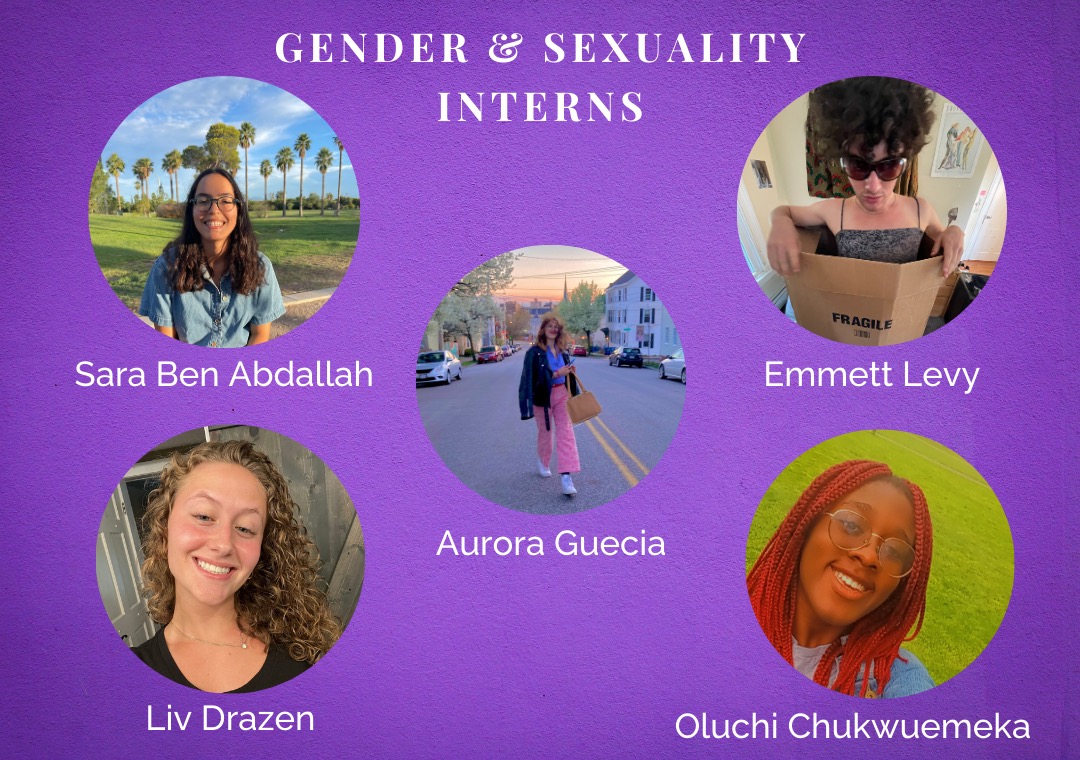
Since its establishment in 2019, the Wesleyan Period Project (WesPeriod) has relaunched each semester, bringing free 100% organic cotton pads (day and night) and tampons (regular and super) to campus while raising awareness for period product equity. These products are available in the following locations: the bathroom of the Resource Center (167 High St.), the front supply room of WesWell (287 High St.), the gender-neutral bathroom on the first floor of Usdan University Center (45 Wyllys Ave.), and the bathroom of the Digital Design Studio (301 High St.). In addition, Lunette menstrual cups are available at the Davison Health Center front reception desk (327 High St.).
The WesPeriod project was created by the Resource Center’s gender and sexuality interns, in collaboration with and supported by eco facilitators, the Green Fund, Davison Health Center, Adolescent Sexual Health Awareness (ASHA), and the Wesleyan Student Assembly (WSA).
The 2023–24 gender and sexuality interns are Sara Ben Abdallah ’26, Liv Drazen ’25, Aurora Guecia ’25, Emmett Levy ’24, and Oluchi Chukwuemeka ’25. Each intern is responsible for distributing the products to one of the five locations, as well as keeping track of stock.
“Open honest communication about our bodies and processes that go on in our bodies and being proud and happy and comfortable in them is so important and acknowledging periods for all bodies… is a very empowering thing, especially when it’s on a campus-wide basis,” Drazen said. “We’re providing the resources for that to be able to be facilitated.”
The Resource Center and the Green Fund provide funding for WesPeriod. The project purchases period products from August and Lola, which offer 100% certified organic cotton options without harmful synthetic additives or bleach, reflecting the Fund’s commitment to sustainability.
“Providing these sustainable and accessible period products will help fight socioeconomic barriers, and most importantly, fight racial barriers and period stigmatization,” Chukwuemeka said. “We want essentially for people to be able to choose what they put inside their body.”
This year’s interns are also focusing on expanding WesPeriod in collaboration with ASHA and WSA by forming the WesPeriod Coalition (WPC), which would allow the program to be eligible for Student Budget Committee (SBC) funding.
“On average, through the Wesleyan Period Project, we’ve provided 2,200 tampons and pads per year, which isn’t enough,” Ben Abdallah said. “We did the calculations, and that’s, on average, one and a half tampons and pads per menstruating student, assuming about half of [the campus population] menstruate…. The program is targeted to students who are lower income, but regardless, this stuff should be free for everybody, which is why we’re pushing this expansion.”
Lilia Kasdon ’26, in collaboration with the other coordinators of ASHA, has been meeting with the Resource Center and members of the WSA, including Community Committee Chair Asija Qyteza ’24, to build upon the work done by the gender and sexuality interns.
Qyteza has previous experience addressing menstrual product equity, having worked closely with the Connecticut Legislature to pass bill HB5272, which requires public education institutions to supply menstrual products in school bathrooms. Since the University is a private institution, it is not affected by this law. Nevertheless, Qyteza and those involved in expanding the WesPeriod project strongly believe that there is an unmet need for broader access to period products at the University.
“We’re working on identifying locations where we think may have the most need,” Qyteza said. “There’s a discussion around institutionalizing [period product access] so we’re barely even starting the expansion process, but we have started discussions on how can we make this part of the institution and how can we ensure that this continues every year.”
Xingyan Guo ’25, in addition to creating an informational zine with Ben Abdallah, is currently involved in mapping suggestions for additional areas where period products might be useful and has published the results online in an article titled “Imagining WesPeriod Project.”
“The results of my geo-spatial survey have highlighted that the current locations of the Wesleyan Period Project’s stations at the Resource Center, Digital Design Studio, and WesWell may not be the most convenient for students, whether for emergency purposes or regular stocking,” Guo wrote in the article. “Based on the survey data, we should consider adding new stations at Exley [Science Center], Freeman Athletic Center, Olin [Memorial Library], and [the Butterfields] to better serve the needs of more students. In addition, the survey data has allowed us to consider distributing different quantities of products in public and residential spaces, while we can buy the same amount of tampons and pads.”
Due to the complicated nature of the institutionalization of period product funding, current plans include working with the Jewett Center for Community Participation (JCCP) to create the Wesleyan Period Coalition (WPC), promoting menstrual equity both at the University and the broader Middletown community.
“Wesleyan Period Coalition (WPC) aims to fight against period stigma and period poverty within the Wesleyan community, as well as the broader Middletown community,” Kasdon wrote in an email to The Argus. “Addressing period poverty and deconstructing period stigma is a joint project. It is important that we all take part in this work, regardless of gender or menstruating status.”
Those interested in getting involved with the WPC can email wesperiodco@gmail.com.
Oluchi Chukwuemeka is an Assistant Sports Editor for The Argus.
Rose Chen can be reached at rchen@wesleyan.edu.


Leave a Reply